I'm adding this answer to let you know of the option of using smbprotocol; as well as expand in case of misunderstood terminology.
SMBProtocol Owner Info
It is possible to get the SID using the smbprotocol library as well (just like with the pysmb library).
This was brought up in the github issues section of the smbprotocol repo, along with an example of how to do it. The example provided is fantastic and works perfectly. An extremely stripped down version
However, this also just retrieves a SID and will need a secondary library to perform a lookup.
Here's a function to get the owner SID (just wrapped what's in the gist in a function. Including here in case the gist is deleted or lost for any reason).
import smbclient
from ldap3 import Server, Connection, ALL,NTLM,SUBTREE
def getFileOwner(smb: smbclient, conn: Connection, filePath: str):
from smbprotocol.file_info import InfoType
from smbprotocol.open import FilePipePrinterAccessMask,SMB2QueryInfoRequest, SMB2QueryInfoResponse
from smbprotocol.security_descriptor import SMB2CreateSDBuffer
class SecurityInfo:
# 100% just pulled from gist example
Owner = 0x00000001
Group = 0x00000002
Dacl = 0x00000004
Sacl = 0x00000008
Label = 0x00000010
Attribute = 0x00000020
Scope = 0x00000040
Backup = 0x00010000
def guid2hex(text_sid):
"""convert the text string SID to a hex encoded string"""
s = ['\\{:02X}'.format(ord(x)) for x in text_sid]
return ''.join(s)
def get_sd(fd, info):
""" Get the Security Descriptor for the opened file. """
query_req = SMB2QueryInfoRequest()
query_req['info_type'] = InfoType.SMB2_0_INFO_SECURITY
query_req['output_buffer_length'] = 65535
query_req['additional_information'] = info
query_req['file_id'] = fd.file_id
req = fd.connection.send(query_req, sid=fd.tree_connect.session.session_id, tid=fd.tree_connect.tree_connect_id)
resp = fd.connection.receive(req)
query_resp = SMB2QueryInfoResponse()
query_resp.unpack(resp['data'].get_value())
security_descriptor = SMB2CreateSDBuffer()
security_descriptor.unpack(query_resp['buffer'].get_value())
return security_descriptor
with smbclient.open_file(filePath, mode='rb', buffering=0,
desired_access=FilePipePrinterAccessMask.READ_CONTROL) as fd:
sd = get_sd(fd.fd, SecurityInfo.Owner | SecurityInfo.Dacl)
# returns SID
_sid = sd.get_owner()
try:
# Don't forget to convert the SID string-like object to a string
# or you get an error related to "0" not existing
sid = guid2hex(str(_sid))
except:
print(f"Failed to convert SID {_sid} to HEX")
raise
conn.search('DC=dell,DC=com',f"(&(objectSid={sid}))",SUBTREE)
# Will return an empty array if no results are found
return [res['dn'].split(",")[0].replace("CN=","") for res in conn.response if 'dn' in res]
to use:
# Client config is required if on linux, not if running on windows
smbclient.ClientConfig(username=username, password=password)
# Setup LDAP session
server = Server('mydomain.com',get_info=ALL,use_ssl = True)
# you can turn off raise_exceptions, or leave it out of the ldap connection
# but I prefer to know when there are issues vs. silently failing
conn = Connection(server, user="domain\username", password=password, raise_exceptions=True,authentication=NTLM)
conn.start_tls()
conn.open()
conn.bind()
# Run the check
fileCheck = r"\\shareserver.server.com\someNetworkShare\someFile.txt"
owner = getFileOwner(smbclient, conn, fileCheck)
# Unbind ldap session
# I'm not clear if this is 100% required, I don't THINK so
# but better safe than sorry
conn.unbind()
# Print results
print(owner)
Now, this isn't super efficient. It takes 6 seconds for me to run this one a SINGLE file. So if you wanted to run some kind of ownership scan, then you probably want to just write the program in C++ or some other low-level language instead of trying to use python. But for something quick and dirty this does work. You could also setup a threading pool and run batches. The piece that takes longest is connecting to the file itself, not running the ldap query, so if you can find a more efficient way to do that you'll be golden.
Terminology Warning, Owner != Creator/Author
Last note on this. Owner != File Author. Many domain environments, and in particular SMB shares, automatically alter ownership from the creator to a group. In my case the results of the above is:

What I was actually looking for was the creator of the file. File creator and modifier aren't attributes which windows keeps track of by default. An administrator can enable policies to audit file changes in a share, or auditing can be enabled on a file-by-file basis using the Security->Advanced->Auditing functionality for an individual file (which does nothing to help you determine the creator).
That being said, some applications store that information for themselves. For example, if you're looking for Excel this answer provides a method for which to get the creator of any xls or xlsx files (doesn't work for xlsb due to the binary nature of the files). Unfortunately few files store this kind of information. In my case I was hoping to get that info for tblu, pbix, and other reporting type files. However, they don't contain this information (which is good from a privacy perspective).
So in case anyone finds this answer trying to solve the same kind of thing I did - Your best bet (to get actual authorship information) is to work with your domain IT administrators to get auditing setup.
